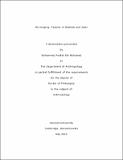| dc.contributor.advisor | Caton, Steven C. | |
| dc.contributor.author | Mohamad, Muhammad Arafat Bin | |
| dc.date.accessioned | 2013-09-25T01:13:15Z | |
| dc.date.issued | 2013-09-24 | |
| dc.date.submitted | 2013 | |
| dc.identifier.citation | Mohamad, Muhammad Arafat Bin. 2013. Be-Longing: Fatanis in Makkah and Jawi. Doctoral dissertation, Harvard University. | en_US |
| dc.identifier.other | http://dissertations.umi.com/gsas.harvard:10936 | en |
| dc.identifier.uri | http://nrs.harvard.edu/urn-3:HUL.InstRepos:11107811 | |
| dc.description.abstract | This dissertation is a study about belonging among the Fatanis who are caught between two places, namely Makkah and Jawi. Using historical and ethnographic data collected during two years of transnational fieldwork in Saudi Arabia, Thailand, and Malaysia, this dissertation shows that belonging is constituted as much by ideas of community, namely home and the homeland, as it is by lived experience as well as practical and cultural factors. Its central argument is that belonging is unstable, often incomplete, and always contingent owing to the dynamic quality of social life. Belonging is a condition that is volatile. It is not something that can be retained perpetually. A person might experience comfort from belonging someplace at a particular moment, while yearning to be somewhere else simultaneously. Thus, longing often accompanies belonging. In the late-eighteenth century, some Fatani men and women left Patani, on the northern Malay Peninsula, and sailed northwest until they arrived at Makkah. These migrants left in search of safety and inspiration as Siamese armies pillaged their homeland in attempts to depopulate Siam’s recalcitrant tributary kingdom from 1785-1839. Almost two and half centuries later, in contemporary times, the Fatanis are once again on the move. This time, unfavorable conditions in Makkah are the causes of reverse migration to the homeland, which the Fatanis refer to as Jawi. For the Fatanis, who are caught between Makkah and Jawi, belonging is elusive. Makkah, the place and society that many of them consider home, is familiar, but also where their right of residency as foreigners is fragile. On the other hand, Jawi, the homeland, is foreign to the Fatanis despite their status as nationals. From one page to another, this text tells the Fatanis’ stories of pain and yearning, but also of their ingenuity and perseverance. | en_US |
| dc.description.sponsorship | Anthropology | en_US |
| dc.language.iso | en_US | en_US |
| dash.license | LAA | |
| dc.subject | Cultural anthropology | en_US |
| dc.subject | belonging | en_US |
| dc.subject | in-betweenness | en_US |
| dc.subject | Makkah | en_US |
| dc.subject | migration | en_US |
| dc.subject | Patani | en_US |
| dc.title | Be-Longing: Fatanis in Makkah and Jawi | en_US |
| dc.type | Thesis or Dissertation | en_US |
| dash.depositing.author | Mohamad, Muhammad Arafat Bin | |
| dc.date.available | 2013-09-25T01:13:15Z | |
| thesis.degree.date | 2013 | en_US |
| thesis.degree.discipline | Anthropology | en_US |
| thesis.degree.grantor | Harvard University | en_US |
| thesis.degree.level | doctoral | en_US |
| thesis.degree.name | Ph.D. | en_US |
| dc.contributor.committeeMember | Bestor, Theodore | en_US |
| dc.contributor.committeeMember | Herzfeld, Michael | en_US |
| dc.contributor.committeeMember | Ho, Engseng | en_US |
| dash.contributor.affiliated | Mohamad, Muhammad Arafat Bin | |


